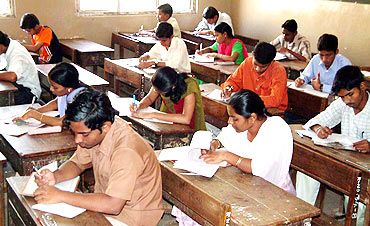 An Indian Administrative Service officer for 32 years, he chose to take the ‘cheating mafia’ head on.
An Indian Administrative Service officer for 32 years, he chose to take the ‘cheating mafia’ head on.
“If you do not let me cheat in the examination, you will be dead.” When this statement was echoed by Dr A K Gupta , principal of an intermediate college in Jalaun town (near Jhansi ) of Uttar Pradesh at an official meeting chaired by secondary education principal secretary Surya Pratap Singh, it did not horrify many other principals who were used to receiving such threats.
But Singh was not among those bureaucrats who would take it casually. An Indian Administrative Service officer for 32 years and a long stint in United States, he chose to take the ‘cheating mafia’ head on.
“I took a vow to eradicate cheating from examinations in Uttar Pradesh or quit the service”, Singh told Rediff.com .
Since then, he has been touring the state and visiting schools and intermediate colleges, holding dialogues with heads of institutions with a view to evolving a strategy to bring an end to a menace that has destroyed the quality of education and undermined the sanctity of examinations conducted by the state’s Madhyamik Shiksha Parishad (UP Board of Secondary Education) -- the country’s biggest education authority.
Gupta also dared to openly speak about last year’s attack on Jalaun’s district inspector of schools who had challenged the ‘cheating mafia’.
Taking a cue from that, Singh got down to spending two days a week out in the remote corners of UP.
“Once you lend them an ear, principals and teachers are ready to speak out and tell you stories of how those involved in encouraging use of unfair means in examinations were able to get away with murder,” he said.
“The racket begins right from the time an institution is registered as an examination centre; hence it is important to nip the menace in the bud.”
Singh was firmly of the view that cheating was not possible without a nexus between government officials, college authorities and students or their guardians.
“Use of unfair means is not possible without an unholy connection between unscrupulous education department officials, school management and the students,” points out.
“It is the race to ensure cent per cent results that often propels school authorities to readily fall into the trap of facilitating cheating in examinations. And the trouble starts with insistence of schools on having their examination centres in their very own institutions. Therefore my emphasis is going to be on ensuring fairness in examinations and not on getting cent per cent results, besides of course completely doing away with the system of examination centres of institutions in their own premises,” he adds.
As many as 61.75 lakh students appeared in the High School and Intermediate examinations in 2014. Of these, 57.25 lakh students passed the examinations. These included 95 per cent girls and 89 per cent boys.
Singh however points out, “But what purpose do such impressive results serve? Nothing. A large number of pass-outs from the existing system end up either jobless or in menial jobs because their education is meaningless.”
He is however not in favour of using an iron hand to put an end to cheating.
“We have seen how an anti-cheating legislation was used only to send young students to jail, which is not a solution to the problem,” he says. He adds, “We need to first educate and sensitise students and their guardians because once they are made to understand the futility of an education qualification obtained through use of unfair means in examination, they would themselves say ‘no’ to cheating.”
Singh simultaneously has dialogue with managers, principals and the district inspectors of schools.
“Interestingly, I am receiving a very positive response, because bulk of the stake-holders are inclined to bring an end to the menace. But no one was ready to bell the cat -- a task undertaken by me with a passion,” he emphasises, while adding, “I am confident that once students, their parents, principals and the inspectors unitedly resolve to root out this malady, cheating will become history.











 © 2025
© 2025